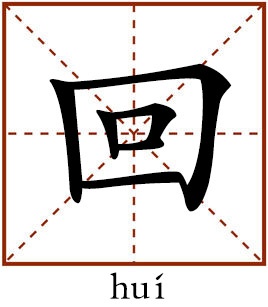Return

This character usually means “go back, return or turn around.”
故国不堪回首月明中
gù guó bù kān huí shǒu yuè míng zhōng
Gu guo refers to motherland and bu kan means “cannot bear.” Hui shou means “turn around or look back.” Yue ming zhong means “under the bright moon.” This term means to recall one’s homeland bitterly under a bright moon.
This is a line from the ci poem, “To the Tune of Yu Mei Ren” by Li Yu (937–978), a master of ci poetry and the last ruler of the Southern Tang Dynasty (937–975). Li was captured by the invading Song Dynasty armies and surrendered. He was poisoned on the orders of Emperor Taizong of Song after three years as an exiled prisoner. Right before his death, Li created this poem, expressing his strong feelings of regret and memories of his lost state. “There is no end to moonlit autumns or flowery springs,/And I have known so very many things./ From my turret the wind was in the east again last night./ A lost land was too much to bear: I turned from the moonlight./ The cavern rail and jade work wall are as they were before:/ Those rosy cheeks alone are there no more./ Tell me, what is the uttermost extent of pain, you say?/ Mine is a river swollen in spring and welling east away” (trans. Yang Xianyi and Gladys Yang).
Moonlit autumns and flowery springs often represent good times in Chinese literature, in this poem, however, Li wishes the season to end soon because the good times of his life have gone and now he is a prisoner. The last night in the poem seemed to be a lovely night for everyone—with the spring breeze and fair moonlight—except Li, who cannot bear the sorrow of recalling his lost land. Then Li guesses what the old capital (Jinling, also present-day Nanjing, Jiangsu Province) would have been like at that time—his exquisite palaces must still have been there, but his palace maids may have gone. In the last two lines of the poem, Li uses the spring torrent flowing eastward as a metaphor for his endless sorrow.
Li has been regarded as an incompetent ruler as he devoted much of his time to pleasure-making and literature, but he was a great poet, who developed ci poetry by broadening its scope from exploring subjects such as love to history and philosophy.
edited by REN GUANHONG
